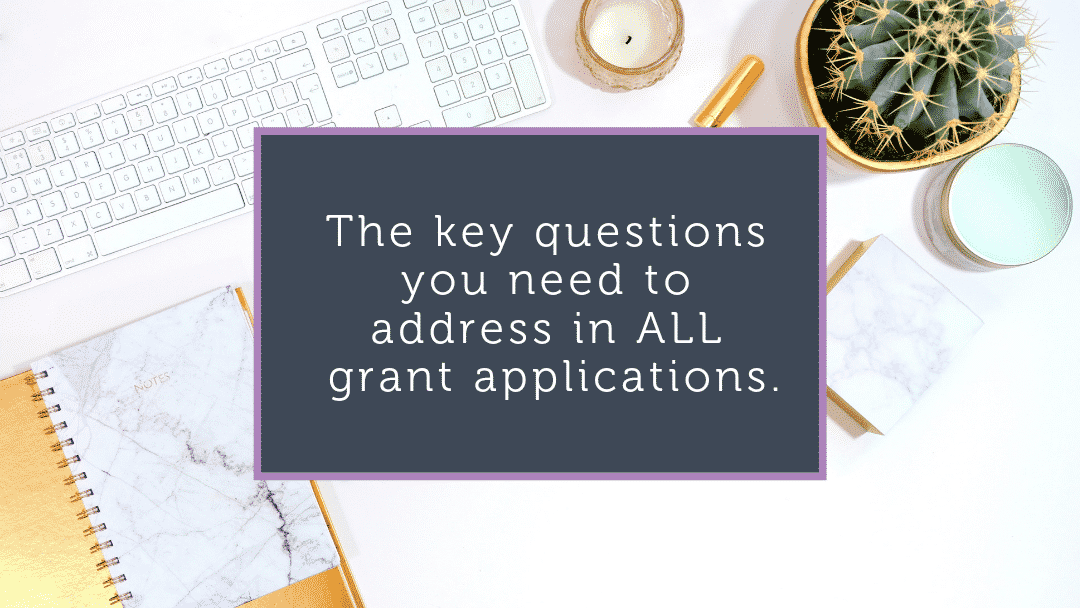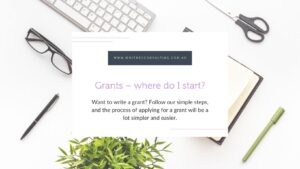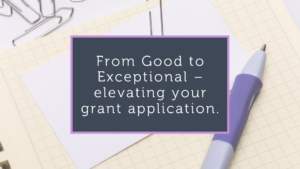Every grant application is different in what it asks you and how it asks you to provide the information. However, there are some key questions that you need to ensure you answer in every application.
Funding bodies need to know this information in order to determine whether they should fund your project and your organisation.
The key questions you need to address in ALL grant applications:
Why?
You need to tell funders WHY your project is needed. This means that you have to demonstrate a need for the project within your community and/or target group, along with the benefits that will be achieved by receiving funding for your proposed project. Keep in mind you must focus on the NEED aspect rather than the WANT aspect.
Usually a grant application will ask you to address the question of WHY in a section about Project Background, Project Demand or Project Need. However, if it is not clear where you would put the WHY, then you need to make sure you put it somewhere. I recommend placing it in the Project Benefits section, if there is nowhere else that seems suitable.
What?
This is where you will usually be asked to define the proposed project; the Project Description or Project Summary section. The most important thing to remember about the project description is that you are telling assessors exactly WHAT you will do – no emotion or sales pitch here, just cold, hard facts. Lay out what you will achieve and what work has to be done to deliver the project. This is not the place for benefits, just actions.
Who?
You need to tell the funding body who will help you to deliver the project, who supports the project and who it will benefit; who is it for? Go through everything you have said you will do in your WHAT section and identify who you will need to help you deliver that – the Shire or some other approvals body, the owner of the land, local businesses?
Likewise, who could stop you from project success? And who will benefit; users of the facility/service and other beneficiaries. These are your major stakeholders and partners and you need to show the funding body that they support and will utilise your project, via letters of support or signed agreements.
When?
Your project timeframe and milestones. Again, go through your WHAT and break it down into project tasks. In order to deliver your project, what steps will you complete, from beginning to end and how long will each of these steps take? Do not forget to include timeframes for any required approvals and to allow sufficient time for the application to be assessed, before the project starts.
A timeframe that has the project starting a month after the application is due is not realistic. Allow 3 months for government grant applications to be assessed and funding formalised in to an agreement. Be generous with your allocation of time– it is rare for projects to finish on time because people do not allow enough time per task
How?
You will need to demonstrate how you will implement your project. This includes the methodology, governance and procurement that will be in place. This means, how will you deliver the actions you have said you will in your WHAT? What methodology will you use to deliver the project – will you subcontract everything to experts? Will you design the facility and then tender for its construction? How will you procure the assistance you need? Will you use a mate of a mate or will it be an open, advertised opportunity that is overseen by your Board?
How will the project be managed? Exactly who (meaning what is their name and experience) will manage the project and who will they report to; who will oversee the project to make sure it is implemented properly and there are no cost, time or scope changes.
Cost?
Quite simply, your project budget. This does not mean telling the assessor that it will cost $50,000 to complete your project. It means providing a breakdown of the cost of the different elements of your project; how much will the approvals cost, the administration, project management, equipment, construction etc? You need to be clear what makes up the total project budget.
You also need to evidence these costs. You cannot just say that it will cost $100,000 to buy a specific piece of equipment; you need to attach a quote for that amount or somehow evidence that this cost estimate is not based on just a guess.
Don’t forget to include the cost of complying with grant conditions, such as audits or signage, in your budget.
Viability?
The viability of your project means whether or not it is likely to succeed. There is often not a specific section in the application to address this but it needs to be at the forefront of your mind when answering each question in the application.
You can prove viability by enabling the assessor to make a judgement about whether your claims are accurate and whether you are well prepared and capable of delivering the project. This is done by;
- Addressing each of the above questions in detail
- Proving the capability of your organisation by adding examples of past successful projects and the experience of your project manager and Board
- Including evidence from stakeholders that they support and will assist in delivering your project and will use the facility/services/event
- Quoting statistics and data to back up your claims for project need
- Ensuring your timeframes are reasonable and not unrealistic
- Detailing a project methodology that is clear on how it will deliver the project and will provide oversight and accountability over the project manager’s actions
- Evidencing your cost estimates
- Providing detail within your budget and ensuring nothing is missed (a budget that is too low will raise serious concerns over the viability)
When submitting an application for grant funding, there is never a guarantee of success, but if you consistently and thoroughly answer the key questions, you will dramatically increase your success rate.






